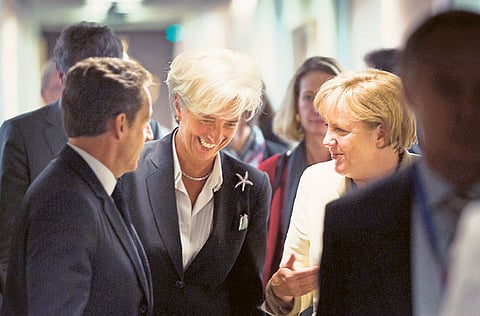Markets rally on EU bailout plan
European Financial Stability Facility will provide loans to Greece, Ireland and Portugal

New York: World stocks and the euro rose on Thursday after news of a plan to use the European bailout fund to make cheap loans to Greece and other heavily indebted governments in the euro zone.
The new proposal from a summit of European leaders in Brussels reduced fears the debt crisis would spread to other Eurozone countries and led traders to cut holdings of gold and US and German government bonds.
The European Financial Stability Facility, the zone's bailout fund, will provide loans to Greece, Ireland and Portugal at a lower interest rate and for longer maturities, according to draft summit conclusions seen by Reuters.
"It seems like they may have some solution rather than just kicking the can down the road," said Larry Milstein, head of government and agency trading at R.W. Pressprich & Co in New York. "This could make it easier for them to pay their loans."
Other measures being considered include a bond buyback, but not new taxes on banks, sources said.
Some investors, however, still worry about a possible Greek default, which officials at the emergency summit have not ruled out. Such a move could have repercussions across the European banking system, which holds a hefty sum of euro zone sovereign debt. "An extension of the loans for Greece and increased flexibility for the EFSF to recapitalize institutions takes the heat off the ECB," said Mark McCormick, currency strategist at Brown Brothers Harriman in New York. "It's definitely positive for the euro. It's not a panacea, but it's a step in the right direction."
According to the draft, the maturities on Eurozone rescue loans to all three assisted countries would be extended to 15 years from 7.5 and the interest rate cut to around 3.5 per cent from between 4.5 and 5.8 per cent now. The EFSF would be able to lend to states on a precautionary basis instead of waiting until they are shut out of market funding, and to recapitalise banks via loans to governments, even if they are not under an EU/IMF assistance programme.
Crisis response
Europe is willing to let Greece default under a crisis response that calls for a bond buyback, a debt swap but no new tax on banks. The private sector contribution to the deal would involve a 20 percent writedown on Greek bonds, sources said.
"It's the hope that something has been agreed out of the Summit without any sort of a bank tax," one dealer said.
Senior bankers were present in the corridors of the summit but not at the table, officials said. They included Baudouin Prot of BNP Paribas, the foreign bank with the biggest exposure to Greek debt, and Deutsche Bank chief executive Josef Ackermann, chairman of the International Institute of Finance, which drafted proposals for private sector involvement. Top Greek bankers were also present.
German Chancellor Angela Merkel and French President Nicolas Sarkozy crafted a common position in late night talks in Berlin with ECB President Jean-Claude Trichet.
Sign up for the Daily Briefing
Get the latest news and updates straight to your inbox



